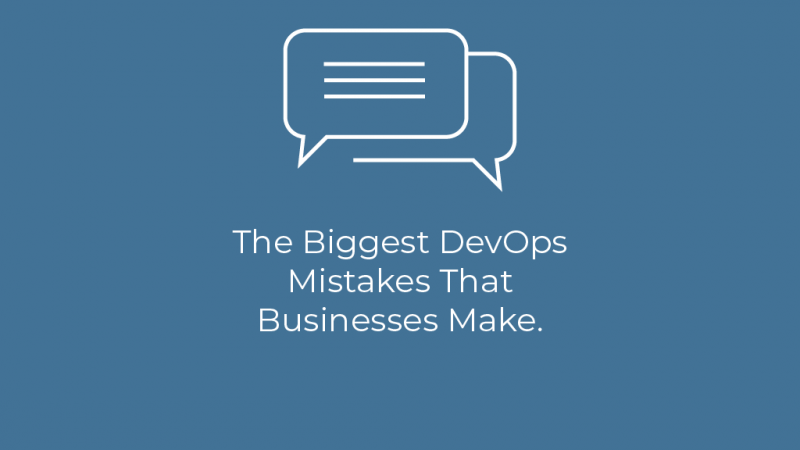The Biggest DevOps Mistakes That Businesses Make
Implementing DevOps can give teams a massive boost, encouraging collaboration and shared responsibility. But you have to do it right, because bad DevOps can be worse than no DevOps at all, as Andrew Stickland explains.
- April 10, 2018

In my last blog post, I looked at cargo cults and how they pervade DevOps thinking in many businesses. Simply put, in many cases, DevOps is not fully understood, but certain elements of it are nonetheless recognised and implemented. This results in an incomplete and often inadequate emulation of DevOps that can actually cause more problems than it solves, with senior IT professionals simply missing the point.
DevOps is a mindset and cultural issue not a department, job or even set a of discrete tasks! Unfortunately, this aspect doesn’t gel well with traditional approaches to IT, and the result is a kind of inappropriate amalgamation of the two.
Read Part 1: Better DevOps: How To Identify The Problem Of DevOps Cargo Cults
Automation <> DevOps

One of the biggest mistakes that organisations make is to directly associate automation with DevOps. The simple fact is that while automation might be part of a successful DevOps implementation, it’s not actually a necessary facet of DevOps in general.
For example, I was recently talking to a head of engineering at a large financial institution. He told me he had been informed that the board had decided to initiate a programme to automate all their infrastructure provisioning. His primary concern was that this would probably happen in isolation to the development tooling already in place.
This, of course, misses the entire point of DevOps, where automation is good but not entirely essential. Automation will make things work better but only if it exists in a framework that allows it to do so. Yes, you’re going to see improvements in performance and, hopefully, reliability if you automate – but you’re not going to change your world.
And, of course, this development in isolation is simply maintaining the silos already in place – the antithesis of what DevOps is trying to achieve.
I’ve actually heard people say “We’ve bought JIRA Agile (as it was called – now part of JIRA Software) so we’re now an agile company”. Here, we’re getting “We’ve automated ops so now we’ve got DevOps”. Nothing could be further from the truth – this sort of position is fundamentally flawed. Neither DevOps or Agile are simple paradigms where you can follow a prescribed set of rules and you’re done.
Just Another Silo

The whole point of DevOps is to create seamless integration of and collaboration between development and operations, breaking down silos in the process. That, however, has not stopped companies from setting up dedicated DevOps departments or advertising positions for ‘DevOps engineer’.
The flaw in this thinking should be evident. By creating specialist jobs and departments for DevOps, all you do is create yet more silos, putting middlemen into a situation that is crying out for consolidation of influencing parties.
I recently heard a presentation from a senior manager at an international airline, who was describing their journey towards DevOps. Having heard that DevOps was about getting development and operations to work better together, they created a DevOps team to ensure that work flowed from development to operations effectively. And they were also to ensure that operations data flowed back to the development teams effectively.
What they learnt was they had simply created a further disconnect between development and operations. Rather than bringing those teams together, they had widened the gulf and introduced a bottleneck that just exacerbated their problems. In fact, the DevOps team became a significant roadblock and became the whipping boy for any problem or delay that was encountered.
I understand that this became such a burden that the entire team quit as one – leaving a yawning gulf in their wake.
What are the solutions to these problems? I’ll be exploring this in the final post of this series – follow Clearvision on Twitter, LinkedIn or Facebook to make sure you don’t miss the next update!
clearvisionwebmaster
Atlasssian expert resources
Visit our blog for expert news and articles from the Atlassian world. On our resources page you will find recorded webinars, white papers, podcasts, videos and more.
The Software Blog
Read our blog for articles offering best practice advice written by Atlassian experts, as well as the latest news concerning your software.
Software White Papers and Guides
Dive deep into Atlassian software with our white papers and guides on individual tools, partner products, services, and best practices, written by the experts.
Expert Webinars
All of our webinars are pre-recorded and available to watch on-demand. Enjoy everything from partner features to application demos and updates from Atlassian experts.















